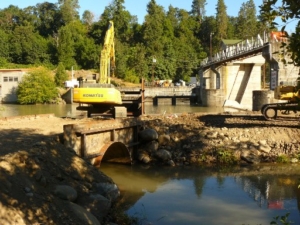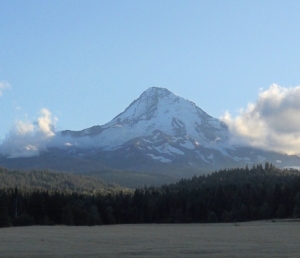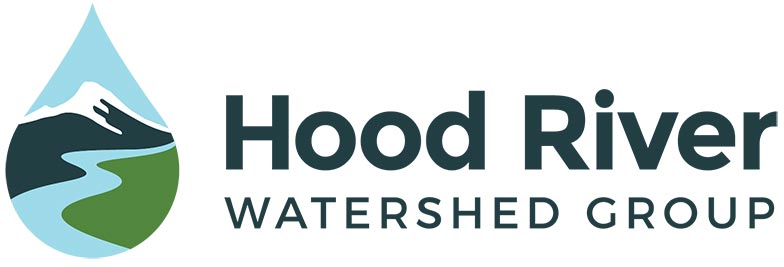Earth Day Volunteer Work Party at Indian Creek Trail
Contact us at: (541) 386-6063 or alix@hoodriverwatershed.org
Patricia Robles will be serving her famous tacos, and dessert will follow. The Ruins will be providing beer and wine for purchase (non-alcoholic beverages available for free).
$45 tickets include dinner, dessert, & one $5 raffle ticket.
Rebecca McCoun, Riparian & Aquatic Specialist with the Oregon Department of Forestry Monitoring Unit, presents on the recently passed Forest Practices Act rules that came out of the Private Forest Accord report and legislation. Rebecca provides an overview on the Private Forest Accord Report, draft Aquatic Habitat Conservation Plan, and the resulting new and revised Forest Practice Act rules that will further protect Oregon’s aquatic resources. She also highlights the development of the Small Forestland Office and the new programs and resources available to small landowners.
The Oregon Watershed Enhancement Board (OWEB) is a state agency that provides grants to help Oregonians take care of local streams, rivers, wetlands and natural areas. The Hood River Watershed Group receives significant funding from OWEB for organizational capacity and project-based work. Council Capacity grants help support the operating capacity of effective watershed councils like ours. As part of these Council Capacity grants, OWEB has a merit review process that encourages continuous improvement of watershed councils’ organizational management, operating structure, and the planning and implementation of on-the-ground watershed, restoration, and community engagement activities. The merit review process also ensures watershed councils are working toward strengthening their role in watersheds through activities focusing on organizational resilience, leadership, collaboration, and that the watershed council represents a balance of interested and affected persons within the watershed. All watershed councils that receive a Council Capacity grant are required to complete a biennial self-assessment in order to assess the organization and identify areas for improvement. This self-assessment was developed to help watershed councils identify strengths and challenges of their organizations, and establish capacity building goals.
We hope you’ll participate in this important evaluation process! The first step is to participate in an online survey. All Watershed Group staff, board members, and general members and stakeholders are encouraged to participate.
In the survey, you will be rating the Watershed Group on a variety of capacity elements:
1. Leadership: the capacity of organizational leaders to inspire, prioritize, make decisions, provide direction, and innovate.
2. Adaptive: the capacity of the Watershed Group to monitor, assess, and respond to internal and external changes.
3. Management: the capacity of the Watershed Group to ensure the effective and efficient use of organizational resources.
4. Operational: the capacity of the Watershed Group to implement key organizational and programmatic functions.
For each question in the survey, identify the description that best describes the Watershed Group’s status or level of performance. You are likely to discover that, for some questions, the Watershed Group’s capacity will not fully match any of the descriptions. In these instances, simply identify the description that is most suitable. It is better to underestimate rather than overestimate in a particular area.
At the Watershed Group meeting on February 28th, we will discuss the results, reach consensus on one set of ratings that best represents our organization, and prioritize areas of improvement for the next two years. Please take the survey by the end of the day on Friday, February 24th. The survey will take between 20-30 minutes to complete.
We have a lot to celebrate from 2022, including restoration projects completed, new funding sources secured, and becoming a nonprofit organization! Join us for a celebration of all this plus the Watershed Group’s 25th Anniversary with guest speaker Meta Loftsgaarden, Forest Supervisor of the Mt. Hood National Forest.
Tickets are $25 and include appetizers, dinner, and one drink.
Purchase your ticket at this link. Space is limited, so purchase your tickets ASAP!
Thank you to pFriem Family Brewers for hosting us!
High alpine environments provide the hydrologic and biologic foundation for ecosystems and communities downstream. It’s known that the vast majority of mountain glaciers across the globe are in retreat due to climate change. What this means for the future of these fragile alpine ecosystems is still largely unknown. We do know that glacial melt supports streams, and studies have shown that meltwater recharges the shallow alluvial aquifer of glacial catchments, however we don’t know how much mountain recharge comes from glacial meltwater. Jordyn Miller, a PhD Candidate at Purdue University, talks about this recharge process, and plans for future work in this field.
Healthy aquatic ecosystems provide fish habitat, irrigation water, and clean drinking water, as well as supporting recreation and other industries. Because native fish populations are central to the structure and function of aquatic ecosystems, they serve as ideal indicators of the overall health of aquatic habitat.
Efforts to restore aquatic habitat and recover the watershed’s threatened fish species are the foundation of WATERSHED 2040, the Hood River Basin Partnership’s Strategic Action Plan, which encompasses an ambitious scope of work for restoring fish habitat, streamflow, and water quality over the next 20 years. Much of this work will also strengthen the resiliency of our community and economy, as climate change continues to impact streamflow, water temperature, and aquatic and terrestrial habitats.
Watershed Group Coordinator Cindy Thieman presents a summary of the plan, including goals and objectives, recent studies that have informed our understanding of the watershed’s limiting factors to salmon and steelhead, and restoration opportunities and actions.
Fire and other types of natural disturbance are often assumed to have negative effects on fish and aquatic ecosystems. However, in recent years a more dynamic perspective on aquatic ecosystems has emerged and studies have found that native salmonids are well adapted to disturbance. Gordon Reeves, Emeritus Scientist with the USFS Pacific Northwest Research Station, shares results from studies that he and his colleagues have conducted on the response of salmonids to fire and glacial events, which may have implications for how we approach restoration in the Hood River Watershed.
In 2015, Kate Conley from Columbia Land Trust wrote an article for The Osprey about the 2010 Powerdale Dam Removal and the impact on the Hood River and its native fish. The Osprey asked the Watershed Group to write a follow up article on the project – now ten years post-removal – with a focus on fish recovery and restoration efforts.
The article appears in the current/winter 2021 issue of The Osprey. Read the article here. A color version is here.
Thank you to those who provided information for the article, including Phil Simpson from ODFW, Ryan Gerstenberger from the Confederated Tribes of the Warm Springs, and Kate Conley from Columbia Land Trust.

Watch a recording of the Watershed Group presentation from November 24th, 2020:
David L. Peterson (Emeritus Senior Scientist, U.S. Forest Service, Pacific Northwest Research Station and Professor, University of Washington, School of Environmental and Forest Sciences) & Jessica Halofksy (Director of Western Wildland Environmental Threat Assessment Center and National Wildfire Coordinating Group, U.S. Forest Service) present on:
Climate Change and Forest Ecosystems in the Pacific Northwest

A warmer climate has major implications for forest ecosystems in the Pacific Northwest. In this presentation, David and Jessica discuss the effects of climate change on (1) tree growth and productivity, (2) species distribution and abundance, and (3) disturbances such as wildfire and insect outbreaks. They also summarize highlights of a new assessment of the effects of climate change in Mt. Hood National Forest, and options for improving the resilience of ecosystems to climatic variability and change (read more about this effort here). Also, check out the fascinating story map based on David and Jessica’s recent paper: Changing Wildfire, Changing Forests: A Synthesis on the Effects of Climate Change on Fire Regimes and Vegetation in the Pacific Northwest.
